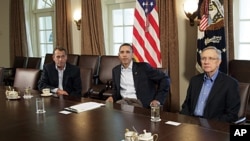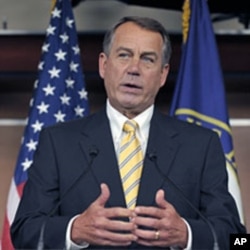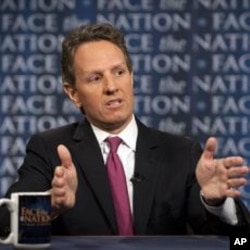The White House and congressional leaders are continuing efforts to reach an agreement that will prevent the United States from defaulting on its debt next month. On Sunday, House of Representatives Speaker John Boehner called on his fellow Republicans to support what he called a "new measure" that would entail a short-term extension of the nation's debt ceiling and spending cuts. But Boehner says he is unsure whether a bipartisan agreement with the Democrat-controlled Senate can be reached.
Speaker Boehner
With the nation and much of the globe waiting to see if the world’s biggest economy and biggest debtor nation can elude financial ruin, Speaker Boehner gave no indication an agreement is imminent that can satisfy House Republicans, the Democratically-controlled Senate, and the White House.
“I would prefer to have a bipartisan approach to solve this problem," he said. "If that is not possible, I and my Republican colleagues in the House are prepared to move on our own, today.”
Negotiations Collapsed
Boehner spoke on the Fox News Sunday television program. After months of talks, debt negotiations between the White House and top lawmakers collapsed Friday over how much new revenue should be included in a multi-trillion-dollar deficit reduction package that would have featured deep spending cuts.
Boehner indicated a so-called “grand bargain” is still possible, but said a smaller package based on a Republican plan approved last week is more likely. That plan relied on spending cuts alone to improve America’s fiscal health. The Senate defeated the measure Friday.
President Barack Obama has said he would prefer an ambitious deficit-reduction package, but would be willing to abide by a technical fix being negotiated by Senate leaders that would allow the president to raise the debt ceiling without majority backing from Congress.
No Deal Yet
With only days remaining to forge an agreement, Treasury Secretary Timothy Geithner expressed dismay that no deal has been reached.
“We started this process seven months ago," he said. "Here we are seven months later. We are running out of runway [time]. We are almost to the edge.”
Geithner also spoke on Fox News Sunday. He said world financial markets and credit ratings agencies will not be impressed if the United States simply raises the debt ceiling without addressing America’s long-term fiscal imbalances.
“The markets are going to look, and the ratings agencies have been very clear they are going to look, at not just whether we successfully avoid a default crisis, which I am very confident that we will. They are going to look at whether we lift the cloud of default off of the American economy, and they are going to look at the quality of savings and reforms we put in place.”
Financial analysts have suggested world markets will be unnerved if the path to a debt deal remains murky.
Markets
House Speaker John Boehner suggested he will not be pressured by the specter of stock and bond market upheaval.
“The American people are asking the question, ‘Where are the jobs?’ And while Asia [Asian markets] may be important, this is about American jobs and the American economy,” said Boehner.
Credit ratings agencies have warned that a downgrading of U.S. debt would result from default, and could also occur if the debt ceiling is raised without fiscal reforms in the United States. Such an outcome would raise interest rates, making America’s debt situation even worse, and putting further strains on a weak U.S. economic recovery.


